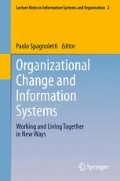Abstract
One of the most addressed kinds of relationships able to generate value in a network is trust (studied in different ways, for different purposes, by different disciplines). While it is very important to keep on investigating this issue using an interdisciplinary and integrated approach, it is also crucial to study the value-generation involved from a perspective able to disentangle what happen both at macro and micro level. In other terms we need a clear distinction between what is commonly called social capital and what is better known as relational capital. In this chapter we focus on the latter by analysing the point of view of the trustee on the bases of the goal oriented theory of trust. We developed a cognitive model of trust to explain why it represents a form of power and, then, a strong asset for individuals acting in a network. Finally, we propose some experimental future works based on this analysis and involving both laboratory experiments and multi-agents systems simulations.
Access this chapter
Tax calculation will be finalised at checkout
Purchases are for personal use only
References
Ramchurn, S.D., Huynh, D., Jennings, N.R. (2004). Trust in multi-agent systems. The Knowledge Engineering Review 19(1), 1–25.
Ricci, A., & Omicini, A. (2004). Engineering trust in complex system through mediating infrastructures. WOA.
Castelfranchi, C., & Tan, Y. H. (Eds.). (2001). Trust and deception in virtual societies. Dordrecht: Kluwer Academic Publisher.
Kagal, L., Finin, T., & Joshi, A. (2001). Trust based security for pervasive computing environments. IEEE Communications, 34(2), 154–157.
Castelfranchi, C., & Falcone, R. (2010). Trust theory: A socio-cognitive and Computational model. UK: Wiley.
Witkowski, M., Artikis, A., & Pitt, J. (2001). Experiments in building experiental trust in a society of objective-trust based agents. In R. Falcone, M. Sing, & Y.-H. Tan (Eds.), Trust in cyber-societies. Berlin: Springer.
Jonker, C. M., & Treur, J. (1999). Formal analysis of models for the dynamics of trust based on experiences. In F. J. Garijo & M. Boman (Eds.), Multi-agent system engineering: Proceedings of the 9th European workshop on modeling autonomous agents in a multi-agent world, lecture notes in artificial intelligence (Vol. 1647). Berlin: Springer.
Carbó, J., Molina, J. M., & Dávila, J. (2005). Fuzzy referral based cooperation in social networks of agents. AI Communications, 18, 1.
Yu, B., Singh, M.P., Sycara, K. (2004). Developing trust in large-scale peer-to-peer systems. In Proceedings of the First IEEE Symposium on Multi-Agent Security and Survive-ability.
Sabater, J., & Sierra, C. (2005). Review on computational trust and reputation models. Artificial Intelligence Review, 24 (1).
Billhardt, H., Hermoso, R., Ossowski, S., Centeno, R. (2007). Trust-based service provider selection in open environments. In proceeding of the he 22nd Annual ACM “Symposium on Applied Computing”.
Arcos, J. L., Esteva, M., Noriega, P., Rodríguez, J. A., & Sierra, C. (2005). Engineering open environments with electronic institutions. Journal on Engineering Applications of Artificial Intelligence, 18(2), 191–204.
Coleman, J.S (1988). Social capital in the creation of human capital. American Journal of Sociology, 94.
Putnam, R. (1993). The prosperous community: social capital and public life. In American Prospect, Vol. 13.
Resnick, P. (2002). Beyond bowling together: Sociotechnical capital. In J. M. Carroll (Ed.), HCI in the new millennium. New York: Addison-Wesley.
Brehm J., & Rahn W. (1997). Individual-level evidence for the causes and consequences of social capital. American Journal of Political Science, 41(3).
Bowles S., & Gintis H. (2002). Social capital and community governance. Economic Journal, 112.
Falcone, R., Singh, M., & Tan, Y. H. (2001). Trust in cyber-societies: Integrating the human and artificial perspectives, LNAI 2246. Berlin: Springer.
Wooldridge, M. (2002). An introduction to multi-agent systems. Chirchester: Wiley.
Castelfranchi, C., Falcone, R., & Marzo, F. (2007). Being trusted in a social network: Trust as relational capital, Lecture notes in computer science. Germany: Springer.
Castelfranchi C. (2012). Earthquakes in trust networks: Basic dynamic principles (3 Apr 2012) SSRN Working Papers Series.
Scott, W. R. (1995). Institutions and organizations. CA: Sage.
Gal, Y., Grosz, B., Kraus, S., Pfeffer, A., & Shieber, S. (2010). Agent decision-making in open mixed networks. Artificial Intelligence, 174(18), 1460–1480.
Gal Y., Pfeffer A., Marzo F., Grosz B. (2004). Learning social preferences in games. In proceeding of the National conference on artificial intelligence (AAAI). San Jose: California.
Grosz B.J., Kraus S., Talman S., Stossel B., Havlin M. (2004). The influence of social dependencies on decision-making: Initial investigations with a new game. In Third International Joint Conference on Autonomous Agents and Multi-Agent Systems (pp. 782–789). New York.
Gal Y., Grosz B., Kraus S., Pfeffer A., Shieber S. (2005). Colored Trails: a Formalism for Investigating Decision-making in Strategic Environments. In proceeding of the IJCAI Workshop on Reasoning, Representation, and Learning in Computer Games (pp. 25–30). Edinburgh, Scotland, August 2005.
Author information
Authors and Affiliations
Editor information
Editors and Affiliations
Rights and permissions
Copyright information
© 2013 Springer-Verlag Berlin Heidelberg
About this chapter
Cite this chapter
Marzo, F., Castelfranchi, C. (2013). Trust as Individual Asset in a Network: A Cognitive Analysis. In: Spagnoletti, P. (eds) Organizational Change and Information Systems. Lecture Notes in Information Systems and Organisation, vol 2. Springer, Berlin, Heidelberg. https://doi.org/10.1007/978-3-642-37228-5_17
Download citation
DOI: https://doi.org/10.1007/978-3-642-37228-5_17
Published:
Publisher Name: Springer, Berlin, Heidelberg
Print ISBN: 978-3-642-37227-8
Online ISBN: 978-3-642-37228-5
eBook Packages: Business and EconomicsBusiness and Management (R0)

